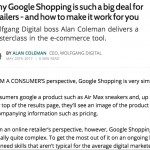For today’s ask-a-journalist we’ve interviewed Adrian Weckler of the Sunday Business Post. He edits a consumer technology section in the newspaper and also a monthly business technology magazine, Computers In Business. Adrian openly comments online on a range of issues in the Irish tech sphere and also in the Irish media industry. In this post we look at Adrian’s role as editor of Computers in Business and his championing of Twitter, the role of the blogger in PR and whether a strong and “smart” economy can be home grown.
Adrian also writes a blog – www.yourtechstuff.com - featuring consumer technology reviews, news and opinions as well as pointers and commentary for those in the media industry. His blog has been nominated for a 2010 Irish Blog Award under the “Best Blog of a Journalist” category sponsored by Bvisible.
Computers In Business has recently expanded in size. Does this reflect that the tech/ IT industry in Ireland is weathering the recession well?
Maybe. Or maybe it’s a sign that we needed to change our emphasis and are doing so. On the broader point of whether the tech/IT industry is weathering the industry well or not, it is certainly outperforming sectors such as property, hospitality, recruitment, motoring and other such areas.
Now, that may only mean that it hasn’t sunk like those other sectors. But in this environment, that’s not bad going. If you look at where new jobs are being created in Ireland — and I mean the ones we regard as important — they’re almost all in IT. Okay, the pharmaceutical sector would say that it is right in there, too. But how many new jobs are being created in the financial or the broader ‘service’ sectors? None. In fact, it’s worse than none. It’s now firmly in the minus figures. I could go on about why this is, that Ireland has not positioned itself as a country that actually makes things or comes up with its own designs, but that’s probably for another questionnaire.
The success of CIB as a paper publication mars the idea that IT professionals are the early adopters who should be reading all their news on screens. Do you think that there will ever come a time where CIB will be delivered purely online?
No I don’t. CIB’s main selling point, as a media product, is that it is published on expensive, glossy, magazine paper. That reflects the investment that we put into it. No-one else does this. In fact, no other mass-market media organisation devotes anything like the investment or commitment in technology coverage that The Sunday Business Post does. (Sorry, I’m digressing once again.)
I do think that online models are the future of publishing, though. And I do think that the current physical paper market is unsustainable. Look at the last circulation and readership figures of mainstream Irish newspapers. Readerships was up for most titles, yet actual sales were down. How can this be explained? By people relying more on online versions of newspapers (which are free and which can be linked to in Twitter and Facebook). I’ll give you an example of what I’m talking about. One of my best friends is a news junkie. And he is an avid reader of newspapers. He reads about six papers a day. Yet he doesn’t buy a single copy. And he’s not asked for any financial contribution for the sizable product he’s getting. That’s a ridiculous model. It’s patently unsustainable.
Personally, I think that there are too many newspapers in Ireland. We have 9 or 10 national daily titles. 9 or 10! New Zealand, which has about the same population as us, has, I think, two national daily titles (or maybe three). Same on Sundays. There are just too many newspapers. I think that before the market goes online, it will shrink in print, first.
You’re a big proponent of good photography and CIB is a very visual magazine when compared to other tech publications. Why, in your view, are good visuals important to a print publication?
Where do I start with this one? I rant about this element of PR approaches more than any other single issue. Think about your own reading habits. Unless you are sitting down to read a book, or a first-class piece of journalism (which is rare these days), you need a packaged product. That means visual stimulation.
There is no possible way for CIB or The Sunday Business Post to present an article on financial software with a few dull headshots of ugly middle-aged men in dark suits and get people to stay on the page more than 15 seconds. It’s a visual disaster. You’re as much as saying to your reader that the subject is too dull for all but the geekiest of IT-savvy accountants.
I could (literally) write another 2,000 words on this single point. But I’m nt. going to. Instead, I’ll point you to where I’ve written about it extensively, in the ‘Media Advice’ section of my blog (www.yourtech.ie).
Your weekly ‘Reality Bytes’ column in the Sunday Business Post is very well cited online, particularly on Twitter on a Monday morning. How open are you to PR approaches over Twitter to issues you cover in this column? How do you like to be approached?
I don’t like being approached in a PR way on Twitter. That’s not to say that I’ll ignore it, but I prefer a little freedom on that forum. I’ll definitely chat and chew the cud over something. But engage in a pitch about a client who’s just won a low-level deal? Thanks but no thanks. Email is much better.
You are quite vocal on some PR practices offering advice in your blog and occasional satire in press on how PR executives can up their game. While we’re sure this type of insight is well read, have you found your advice well heeded?
Not really, but, in all fairness and honesty, I don’t see why they should heed my advice. I’m just one journalist spouting off. And there are other publications out there that engage differently on issues such as pictures. So if you’re a PR firm and you’re doing well, stick to what you’re doing. My advice will probably mess it up for you.
The government frequently talks about an entrepreneur-led smart economy. Do you feel that Irish tech entrepreneurs have the promise to deliver us from the downturn?
No, not really. And I know that that will tick a few people off (I’m looking at you, @jdrumgoole). But the fact is that the overwhelming value that has been created in our technology sector has had nothing to do with any innovation created by any Irish company. By now, we should have hundreds, or at least dozens, of indigenous world-class technology firms of a decent scale. And how many do we actually have? Our tech industry is based largely on big foreign companies asking us to follow their diagrams, of ideas they have thought up. I know this seems a little harsh, but it’s the truth. If there was one thing I would love to see among Irish tech start-ups, it would be to hear nothing from them about demanding handouts and subsidies from the state. I’m sick of hearing about why it’s the state’s fault that they can’t become successful entrepreneurs, because they’re not getting subsidised.
You’ve written on the fallacy of ignoring Twitter as a news outlet while also supporting pay walls or other paid-for content on news websites. Do Twitter and other social media channels undermine professional journalism or complement it? Can a paid-for content model work when news spreads so quickly and freely?
I don’t think Twitter undermines professional journalism one bit. A competent professional journalist will get good stories or create good features regardless of any social networking service.
Yes, paid-for content can work. But only if the majority of the market moves over to it. There is no way that The Irish Times could reintroduce a paywall if the Irish Independent and RTE online remain free. (Arguably, the Times and Indo will never be able to put up a paywall so long as RTE is free, just as British newspapers’ online models are screwed so long as the BBC remains a free service. I think that this is a legitimate issue that will raise its head sooner or later, but that is for another questionnaire.)
Could The Sunday Business Post put up a paywall? Of all of the newspaper titles out there, it would arguably stand the best chance. It has a more lucrative niche than most other titles. Especially because the material we cover tends to become fairly valuable to people researching companies and looking for archived content. However, nothing like that is on our agenda for the time being.
As a blogger journalist you will be no doubt privy to information and review models above and beyond the average blogger. Do you think that bloggers should be taken as seriously as journalists when it comes to issuing review models?
The prankster side of me wants to say a short ‘no way’ and leave it at that, just to see the bitching that would erupt online.
But what I really think is that the difference between ‘journalist’ and ‘blogger’ is often overdone.
Go back to basics: for what organ or service does one write for? Who reads it? How many readers does it have (i.e. what is the potential reach of the copy)? Answer those three questions and it doesn’t matter a damn whether they call themselves a blogger or a journalist.
If you were launching a new perfume, would you prefer to have Perez Hilton at the launch or someone from The London Independent?
Of course, the flip side also applies. If someone writes up their own blog every day and gets 90 regular readers, why the hell would they be a valuable edition to a press launch, from the publicist’s point of view? I mean, compared to someone from the Longford Leader or LMFM? Bloggers often see themselves in an entirely unrealistic way, as contemporaries of writers who reach 200,000 people. In fact, from a publicist’s point of view, I would have thought they were far closer to a small community newspaper that reaches 500 or 1,000 or 2,000 people.
What I am amazed at is how PR and marketing folks don’t ask a very simple question of bloggers: ‘how many readers do you have’? You shouldn’t have any right to be present at something just because you call yourself a ‘blogger’. And that goes as much for a general election count as it does for the launch of a perfume. At least that’s the approach I’d take if I was trying to publicise something.
And let me swing the pendulum around one last time: I am a blogger as well as a print journalist. And sometimes I write ‘news stories’ on my blog and not in the paper (admittedly, mainly because it doesn’t fit a section or a brief). Hell, I’ve even tweeted news stories (mainly because I knew they’d break before Sunday and I wanted to be first).
You recently added video interviews to the Computers In Business website. Is the supplying of product video and exclusive pre-recorded interview content from PR agencies useful for this part of the site? Or do you prefer to shoot it yourself?
Well, let me put this way. If you can deliver to me an interesting, relevant interview with someone who is not the marketing director or boss of some small company trying to sell a product, I’ll consider it.
But let’s face it — why would you set up any other kind of video shoot other than the dull format I’ve just mentioned? You’re hired to get your man into the press, right? And he’s the man, isn’t he? And he’s an Irish executive, which means he’s uncreative and generally petrified of anything unconventional, isn’t he? No, it’d almost have to be shot by myself.
As a reference, I’d point you to Silicon republic’s interviews. I have huge admiration for what they’ve done there, and what they continue to do with their video interviews. Technically, they’re excellent. They’ve invested in a dedicated video guy who brings two cameras to the shoot. I can tell you that. from an Irish media persecutive, that’s impressive. But, but, but… The interviews are boring. Sorry, John! Sorry, Marie! I know that they’re there to serve a purpose. And I know that the subject matter often doesn’t lend itself to stimulating discussion. But it’s just very hard to stay with those interviews for more than 60 seconds, because they just repeat the already overly-familiar corporate memes of the day. I would like to add, again, that I have massive respect for both John Kennedy and Marie Boran in there, two great journalists. You wouldn’t believe the amount of work they have to get through. So this isn’t really meant as a criticism of them or their work. It’s just the format that is dull.
Online Video has been slow to take off in Ireland? Do you expect this to change?
Yes I do. I think that the next generation of journalists are going to be a lot more savvy and comfortable with video technology. And I think that they will start to use this a lot more online. I’m 36 and, in my newspaper, I’m considered to be ‘down with the new technology’, just because I blog, tweet and know how to set up a Flickr or YouTube account. But the 17 and 18 year olds that we’ll be seeing in a couple of years will change this industry.






